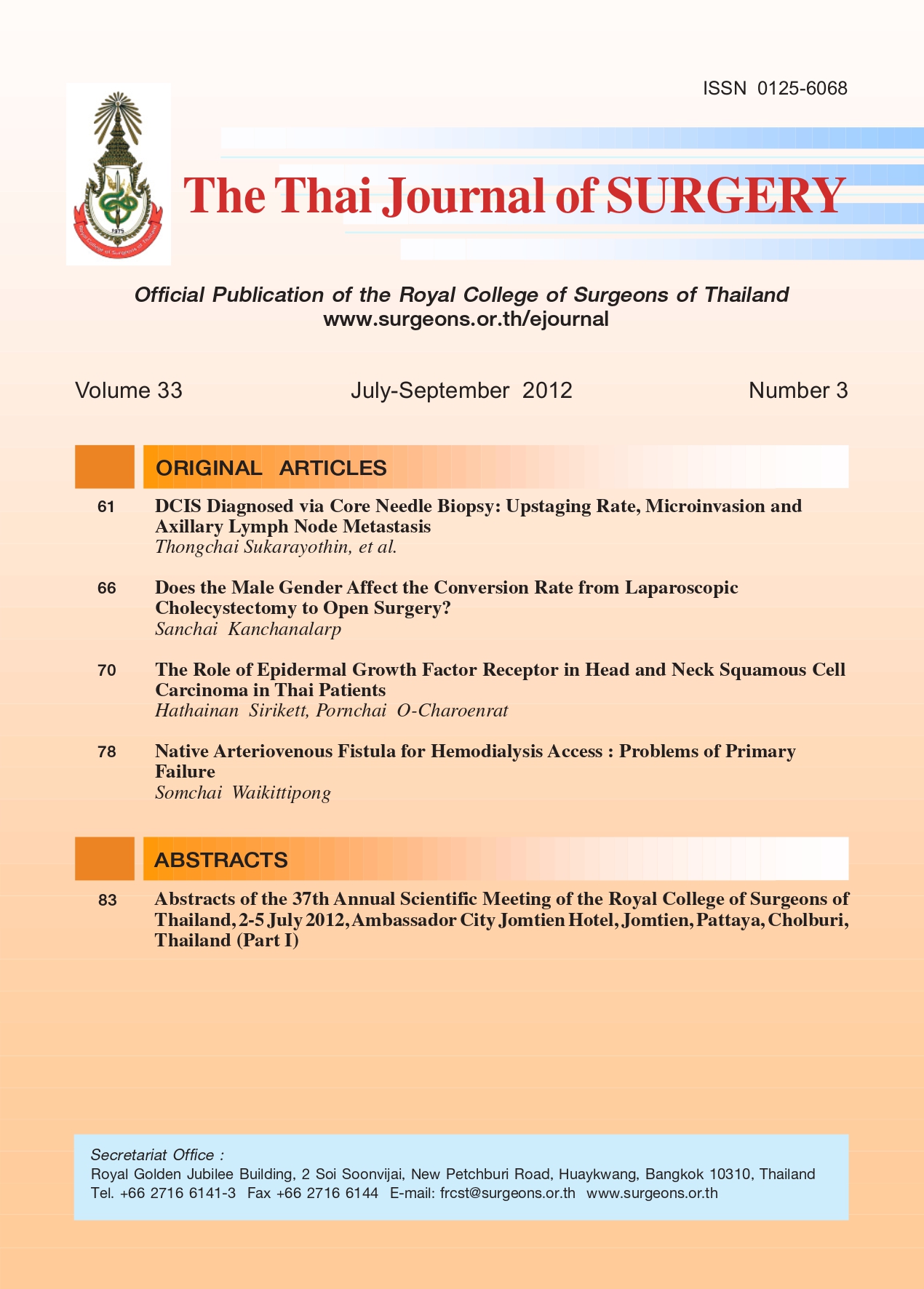Does the Male Gender Affect the Conversion Rate from Laparoscopic Cholecystectomy to Open Surgery?
Keywords:
laparoscopic cholecystectomy, male gender, conversion rateAbstract
Background: Laparoscopic cholecystectomy (LC) has become the standard treatment for symptomaticgallstone but the conversion to open surgery may be required in mostly male patients on clinical observation.
Whether the male gender is the risk factor for conversion is still under debate.
Materials and Methods: A prospective data collection on conversion rate to open surgery in patients who
underwent laparoscopic cholecystectomy during 1997-2011 by a single experienced surgeon.
Results: The study included 244 patients (160 females and 84 males). Among them, 12 (8 males and 4
females) were converted to open surgery. The conversion rate in males and females were 9.52% and 2.5%
respectively (P<0.05). The causes of conversion were due to inflammation and dense adhesion with consequent
anatomical distortion.
Conclusions: The conversion rate was significantly higher among males compared to female patients. This
was probably attributable to delayed surgical decision and treatment.
References
factors in elective laparoscopic Cholecystectomy for
conversion to open Cholecystectomy. J Am Coll Surg 1994;
179: 696-704.
2. Lo CM, Fan ST, Liu CL, Wong J. Early decision for conversion
of laparoscopic to open Cholecystectomy for treatment of
acute cholecystitis. Am J Surg 1997;173: 513-7.
3. Vatansev C, Kartal A, Calayan O, Vatansev H, Yol S, Tekin A.
Why is the conversion rate to open surgery during
Cholecystectomy higher in men than in women?
Proceedings of the Turkish National Surgery Congress. Turkey
2002. p. 177.
4. Zisman A, Gold-Deutch R, Zisman E, Negri M, Halpern Z, Lin
G, et al. Is male gender a risk factor for conversion of
laparoscopic into open Cholecystectomy? Surg Endosc
1996;10:892-4.
5. Yol S, Kartal A, Vatansev C, Aksoy F, Toy H. Sex as a factor
in conversion from laparoscopic cholecystectomy to open
surgery. J Soc Lap Surg 2006;10:359-63.
6. Russel JC, Walsh SJ, Reed-Fourquet L, Mattie A, Lynch L.
Symptomatic cholelithiasis; A difference disease in men?
Connecticut laparoscopic cholecystectomy registry. Ann
Surg 1998;227:195-200.
7. Collet D, Edye M, Perissat J. Conversion and complication
of laparoscopic cholecystectomy. Result of a survey
conducted by The French Society of Endoscopic Surgery
and Interventional Radiology. Surg Endosc 1993;7: 334-8.
8. Jorgensen JO, Hunt DR. Laparoscopic cholecystectomy. A
prospective analysis of the potential causes of failure. Surg
Laparosco Endosc 1993;3:49-53.
9. Orlando R, Russel JC, Lynch J. Laparoscopic cholecystectomy.
A statewide experience. The Connecticut
laparoscopic cholecystectomy registry. Arch Surg 1993;
128:494-8.
10. Randoux O, Desrousseaux B, Atal I, Sarkis P, Corman N,
Ampe J. Conversion laparotomies during cholecystectomies
under laparoscopy. Apropos of 285 consecutive
cholecystectomies. J Chir (Paris) 1992;129:519-22.
11. Smith JF, Boysen D, Tschirhart J, William T, Vasilenko P.
Comparison of laparoscopic cholecystectomy versus
elective open cholecystectomy. J Laparoendosc Surg
1992;2:311-7.
12. Taniguchi Y, Ido K, Kimura K, Yoshida Y, Ohtani M, Kavamoto
C, et al. Introduction of a “safety zone” for the safety of
laparoscopic Cholecystectomy. Am J Gastroenterlo
1992;88:1258-61.
13. Morrow DJ, Thomson J, Wilson JE. Acute cholecystectomy in
the elderly. Arch Surg 1978;113:1142-52.
14. Wilson AD, Kosol RA, Salwa WA, et al. Gangrenous
cholecystitis in an urban VA hospital. J Surg Dis 1994; 56: 402-
4.
15. Kanaan SA, Murayama KM, Merrium LT, et al. Risk factors for
conversion of laparoscopic to open cholecystectomy. J
Surg Res 2002;106:20-4.
16. Margiotta SJ, Horwitz JR, Willia IH, Wallack MK. Cholecystectomy
in the elderly. Am J Surg 1988;156: 509-12.
17. Rice DP, Hodgson JA, Kopstein AN. The economic costs of
illness. Health care financing review 1985;7:61-80.
18. Friedman GD, Raviola CA, Fireman B. Prognosis of gallstones
with mild or no symptoms. J Clin Epidemiol 1989;42:127-36
Downloads
Published
How to Cite
Issue
Section
License
Articles must be contributed solely to The Thai Journal of Surgery and when published become the property of the Royal College of Surgeons of Thailand. The Royal College of Surgeons of Thailand reserves copyright on all published materials and such materials may not be reproduced in any form without the written permission.



